- Home
- James Clavell
King Rat Page 3
King Rat Read online
Page 3
The King knew that Grey had been watching him all the time. The excitement of making a deal in front of the MP hut added to his well-being. Pleased with himself, he walked up the slight rise, responding automatically to the greetings of the men—officers and enlisted men, English and Australian—that he knew. The important ones got special treatment, the others a friendly nod. The King was conscious of their malevolent envy and it bothered him not at all. He was used to it; it amused him and added to his stature. And he was pleased that the men called him the King. He was proud of what he had done as a man—as an American. Through cunning he had created a world. He surveyed his world now and was well satisfied.
He stopped outside Hut Twenty-four, one of the Australian huts, and poked his head through a window.
“Hey, Tinker,” he called out. “I want me a shave and a manicure.”
Tinker Bell was small and wiry. His skin was pigment-brown and his eyes were small and very brown and his nose was peeling. He was a sheep shearer by trade but he was the best barber in Changi.
“Wot’s this, your ruddy birthday? I gave you a manicure the day before yesterday.”
“So I get another today.”
Tinker shrugged and jumped out the window. The King sat back in the chair under the lee of the hut’s overhang, relaxing contentedly as Tinker put the sheet around his neck and settled him just right. “Look at this, mate,” he said, and held a little cake of soap under the King’s nose. “Smell it.”
“Hey,” said the King, grinning. “That’s the real McCoy.”
“Don’t know about that, mate! But it’s Yardley’s ruddy violets. A cobber o’ mine swiped it on a work party. Right from under the nose of a bloody Nip. Cost me thirty dollars,” he said with a wink, doubling the price. “I’ll keep it just for you, special, if you likes.”
“Tell you what. I’ll make it five bucks a time, instead of three, as long as it lasts,” the King said.
Tinker calculated quickly. The cake of soap would last perhaps eight shaves, maybe ten. “Strike a light, mate. I ’ardly makes me money back.”
The King grunted. “You got taken, Tink. I can buy that by the pound for fifteen a cake.”
“My bloody oath,” Tinker burst out, feigning anger. “A cobber taking me for a sucker! Now that ain’t right!” Furiously he mixed hot water and the sweet-smelling soap into a lather. Then he laughed. “You’re the King all right, mate.”
“Yeah,” the King said contentedly. He and Tinker were old friends.
“Ready, mate?” Tinker asked as he held up the lathered brush.
“Sure.” Then the King saw Tex walking down the path. “Wait a minute. Hey, Tex!” he called out.
Tex looked across at the hut and saw the King and ambled over to him. “Yeah?” He was a gangling youth with big ears and a bent nose and contented eyes, and he was tall, very tall.
Without being asked, Tinker moved out of earshot as the King beckoned Tex closer. “Do something for me?” he asked quietly.
“Sure.”
The King took out his wallet and peeled off a ten-dollar note. “Go find Colonel Brant. The little guy with the beard rolled under his chin. Give him this.”
“You know where he’d be?”
“Down by the corner of the jail. It’s his day for keeping an eye on Grey.”
Tex grinned. “Hear you had a set-to.”
“The son of a bitch searched me again.”
“Tough,” said Tex dryly, scratching his blond crewcut.
“Yes.” The King laughed. “And tell Brant not to be so goddam late next time. But you should have been there, Tex. Man, that Brant’s a great actor. He even made Grey apologize.” He grinned, then added another five. “Tell him this is for the apology.”
“Okay. That all?”
“No.” He gave him the password and told him where to find Major Barry, then Tex went his way and the King settled back. Altogether, today had been very profitable.
Grey hurried across the dirt path and up the steps to Hut Sixteen. It was almost lunchtime and he was painfully hungry.
Men were already forming an impatient line for food. Quickly Grey went to his bed and got his two mess cans and mug and spoon and fork and joined the line.
“Why isn’t it here already?” he wearily asked the man ahead of him.
“How the hell do I know?” Dave Daven said curtly. His accent was public school—Eton, Harrow or Charterhouse—and he was tall like bamboo.
“I was just asking,” Grey said irritably, despising Daven for his accent and his birthright.
After they had waited an hour, the food arrived. A man carried two containers to the head of the line and set them down. The containers had formerly held five gallons of high-octane gasoline. Now one was half full of rice—dry, pellucid. The other was full of soup.
Today it was shark soup—at least, one shark had been divided ounce by ounce into soup for ten thousand men. It was warm and tasted slightly of the fish, and in it there were pieces of eggplant and cabbage, a hundred pounds for ten thousand. The bulk of the soup was made from leaves, red and green, bitter and yet nutritious, grown with so much care in the gardens of the camp. Salt and curry powder and chili pepper spiced it.
Silently each man moved forward in turn, watching the serving of the man in front and the man behind, measuring their portions against the one he was given. But now, after three years, the measures were all the same.
A cup per man of soup.
The rice was steaming as it was served. Today it was Java rice, each grain separate, the best in the world. A cupful per man.
A mug of tea.
Each man took his food away and ate silently, quickly, with exquisite agony. The weevils in the rice were added nourishment, and the worm or insect in the soup was removed without anger if it was seen. But most men did not look at the soup after the first quick glance to find out if there was a piece of fish in it.
Today there was a little left over from the servings and the list was checked and the three men who headed it got the extra and thanked today. Then the food was gone and lunch was over and dinner was at sundown.
But though there was only soup and rice, here and there throughout the camp a man might have a piece of coconut or half a banana or piece of sardine or thread of bully or even an egg to mix with his rice. One whole egg was rare. Once a week, if the camp hens laid according to plan, an egg was given to each man. That was a great day. A few men were given one egg every day, but no man wanted to be one of the special few.
“Hey listen, you chaps!” Captain Spence stood in the center of the hut, but his voice could be heard outside. He was officer of the week, the hut adjutant, a small dark man with twisted features. He waited till they had all moved inside. “We’ve got to supply ten more bods for the wood detail tomorrow.” He checked his list and called out the names, and then looked up. “Marlowe?” There was no reply. “Anyone know where Marlowe is?”
“I think he’s down with his unit,” Ewart called out.
“Tell him he’s on the airfield work party tomorrow, will you?”
“All right.”
Spence started coughing. His asthma was bad today, and when the spasm had passed he continued: “The Camp Commandant had another interview with the Jap General this morning. He asked for increased rations and medical supplies.” He cleared his throat in the momentary hush. Then he went on and his voice was flat. “He got the usual turn-down. The rice ration stays at four ounces of grain per man per day.” Spence looked out of the doors and checked that both lookouts were in position. Then he dropped his voice and all the men listened expectantly.
“The Allies are about sixty miles from Mandalay, still going strong. They’ve got the Japs on the run. The Allies are still going in Belgium but the weather’s very bad. Snowstorms. On the Eastern front, the same thing, but the Russians are going like bats out of hell and expect to take Krakov in the next few days. The Yanks are going well in Manila. They’re near”—he hesitated, trying to rem
ember the name—“I think it’s the Agno River, in Luzon. That’s all. But it’s good.”
Spence was glad that this part was over. He learned the news by heart daily at the hut adjutants’ meeting, and every time he stood up to repeat it publicly, his sweat chilled and his stomach felt empty. One day an informer might point a finger at him and tell the enemy that he was one of the men who delivered the news, and Spence knew that he was not strong enough to stay silent. Or one day a Japanese might hear him tell the others, and then, then …
“That’s all, chaps.” Spence went over to his bunk, filled with nausea. He took off his pants and walked out of the hut with a towel over his arm.
The sun beat down. Two hours yet until the rain. Spence crossed the asphalt street and stood in line for a shower. He always had to have a shower after he gave the news, for the sweat-stench was acrid on him.
“All right, mate?” Tinker asked.
The King looked at his nails. They were well manicured. His face felt tight from the hot and cold towels, and tangy with the lotion. “Great,” he said as he paid him. “Thanks, Tink.” He moved out of the chair, put on his hat and nodded to Tinker and to the colonel who had been waiting patiently for a haircut.
Both men stared after him.
The King walked briskly up the path once more, past clustering huts, heading for home. He was pleasantly hungry.
The American hut was set apart from the others, near enough to the walls to share the afternoon shade, and near enough to the encircling path which was the life stream of the camp and near enough to the fence. It was just right. Captain Brough, USAF, the senior American officer, had insisted that the American enlisted men have their own hut. Most of the American officers would have preferred to move in too—it was difficult for them to live among foreigners—but this was not allowed, for the Japanese had ordered that officers be separated from enlisted men. The other nationalities found this hard to stomach, the Australians less so than the English.
The King was thinking about the diamond. It would not be easy to swing this deal, and this deal he had to swing. Suddenly as he approached the hut, he noticed beside the path a young man sitting on his haunches, talking rapidly in Malay to a native. The man’s skin was heavily pigmented and beneath the skin the muscles showed. Wide shoulders. Slim hips. The man wore only a sarong, and the way he wore it, it seemed to belong. His face was craggy, and though he was Changi-thin, there was a grace to his movements and a sparkle about him.
The Malay—black-brown, tiny—was listening intently to the man’s lilting speech; then he laughed and showed teeth abused by betel nut, and replied, accenting the melodious language with a wave of his hand. The man joined his laugh and interrupted with a flood of words, oblivious of the King’s intent stare.
The King could catch only a word here and a word there, for his Malay was bad and he had to get by with a mixture of Malay and Japanese and pidgin English. He listened to the rich laugh and knew it was a rare thing. When this man was laughing, you could see that the laugh came from inside. This was very rare. Priceless.
Thoughtfully the King entered the hut. The other men looked up briefly and greeted him amiably. He returned their greetings without favor. But he knew and they knew.
Dino was lying on his bunk half asleep. He was a neat little man with dark skin and dark hair, prematurely flecked with gray, and veiled liquid eyes. The King felt the eyes and nodded and saw Dino’s smile. But the eyes were not smiling.
In the far corner of the hut Kurt looked up from the pants he was trying to patch up and spat on the floor. He was a stunted, evil-looking man with yellow-brown teeth, ratlike, and he always spat on the floor and not one of them liked him, for he would never bathe. Near the center of the hut Byron Jones III and Miller were playing their interminable chess. Both were naked. When Miller’s merchant ship was torpedoed two years before, he had weighed two hundred and eighty-eight pounds. He was six feet, seven inches. Now he turned the scale at a hundred and thirty-three, and the folds of belly skin hung like a pelt over his sex. His blue eyes lit up as he reached over and took a knight. Byron Jones III quickly removed the knight, and now Miller saw that his castle was threatened.
“You’ve had it, Miller,” Jones said, scratching the jungle sores on his legs.
“Go to hell!”
Jones laughed. “The Navy could always take the Merchant Marine at anything.”
“You bastards still got yourselves sunk. A battleship yet!”
“Yeah,” Jones said thoughtfully, toying with his eye patch, remembering the death of his ship, the Houston, and the deaths of his buddies and the loss of his eye.
The King walked the length of the hut. Max was still sitting beside his bed and the big black box that was chained to it.
“Okay, Max,” the King said. “Thanks. You can quit now.”
“Sure.” Max had a well-used face. He came from West Side New York and he had learned the lessons of life from those streets at an early age. His eyes were brown and restless.
Automatically the King took out his tobacco box and gave Max a little of the raw tobacco.
“Gee, thanks,” Max said. “Oh yeah, Lee told me to tell you he’s done your laundry. He’s getting chow today—we’re on the second shift—but he told me to tell you.”
“Thanks.” The King took out his pack of Kooas and a momentary hush fell upon the hut. Before the King could get his matches out, Max was striking his native flint lighter.
“Thanks, Max.” The King inhaled deeply. Then, after a pause, he said, “You like a Kooa?”
“Jesus, thanks,” Max said, careless of the irony in the King’s voice. “Anything else you want?”
“I’ll call you if I need you.”
Max walked down the hut to sit on his string bed beside the door. Eyes saw the cigarette but mouths said nothing. It was Max’s. Max had earned it. When it was their day to guard the King’s possessions, well, maybe they’d get one too.
Dino smiled at Max, who winked back. They would share the cigarette after chow. They always shared what they could find or steal or make. Max and Dino were a unit.
And it was the same throughout the world of Changi. Men ate and trusted in units. Twos, threes, rarely fours. One man could never cover enough ground, or find something edible and build a fire and cook it and eat it—not by himself. Three was the perfect unit. One to forage, one to guard what had been foraged and one spare. When the spare wasn’t sick, he too foraged or guarded. Everything was split three ways: if you got an egg or stole a coconut or found a banana on a work party—or made a touch somewhere, it went to the unit. The law, like all natural law, was simple. Only by mutual effort did you survive. To withhold from the unit was fatal, for if you were expelled from a unit, the word got around. And it was impossible to survive alone.
But the King didn’t have a unit. He was sufficient unto himself.
His bed was in the favored corner of the hut, under a window, set just right to catch the slightest breeze. The nearest bed was eight feet away. The King’s bed was a good one. Steel. The springs were tight and the mattress filled with kapok. The bed was covered with two blankets, and the purity of sheets peeped from the top blanket near the sun-bleached pillow. Above the bed, stretched tight on posts, was a mosquito net. It was blemishless.
The King also had a table and two easy chairs, and a carpet on either side of the bed. On a shelf, behind the bed, was his shaving equipment—razor, brush, soap, blades—and beside them, his plates and cups and homemade electric stove and cooking and eating implements. On the corner wall hung his clothes, four shirts and four long pants and four short pants. Six pairs of socks and underpants were on a shelf. Under the bed were two pairs of shoes, bathing slippers, and a shining pair of Indian chappals.
The King sat on one of the chairs and made sure that everything was still in place. He noticed that the hair he had placed so delicately on his razor was no longer there. Crummy bastards, he thought, why the hell should I risk catching their cr
ud. But he said nothing, just made a mental note to lock it up in future.
“Hi,” said Tex. “You busy?”
“Busy” was another password. It meant “Are you ready to take delivery?”
The King smiled and nodded and Tex carefully passed over the Ronson lighter. “Thanks,” the King said. “You like my soup today?”
“You bet,” Tex said and walked away.
Leisurely the King examined the lighter. As the major had said, it was almost new. Unscratched. It worked every time. And very clean. He unscrewed the flint screw and examined the flint. It was a cheap native flint and almost finished, so he opened the cigar box on the shelf and found the Ronson flint container and put in a new one. He pressed the lever and it worked. A careful adjustment of the wick and he was satisfied. The lighter was not a counterfeit and would surely bring eight hundred, nine hundred dollars.
From where he was sitting he could see the young man and the Malay. They were still hard at it, yaketty, yaketty.
“Max,” he called out quietly.
Max hurried up the length of the hut. “Yeah?”
“See that guy,” the King said, nodding out the window.
“Which one? The Wog?”
“No. The other one. Get him for me, will you?”
Max slipped out of the window and crossed the path. “Hey, Mac,” he said abruptly to the young man. “The King wants to see you,” and he jerked a thumb towards the hut. “On the double.”
The man gaped at Max, then followed the line of the thumb to the American hut. “Me?” he asked incredulously, looking back at Max.
“Yeah, you,” Max said impatiently.
“What for?”
“How the hell do I know?”

 Gai-Jin
Gai-Jin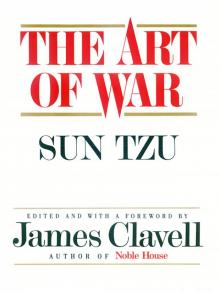 The Art of War
The Art of War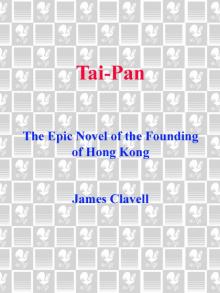 Tai-Pan
Tai-Pan Noble House
Noble House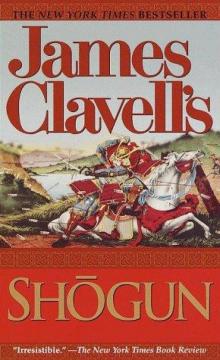 Shōgun
Shōgun Whirlwind
Whirlwind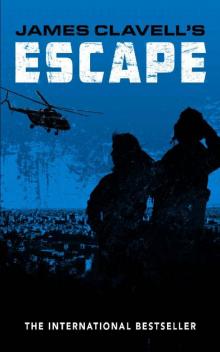 Escape
Escape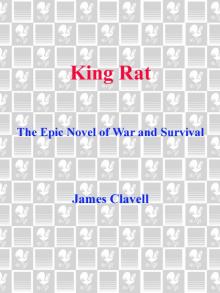 King Rat
King Rat The Children's Story
The Children's Story